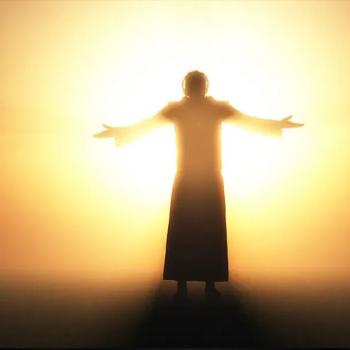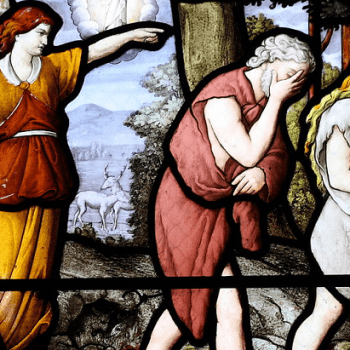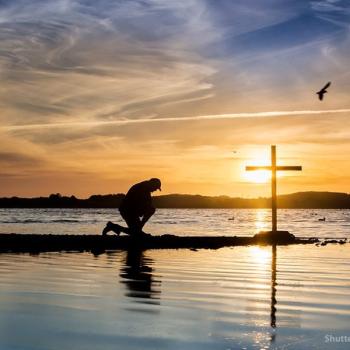 In the previous segment, we discussed the “broken heart” and listed several examples such as King Benjamin’s people who felt “the fear of the Lord”, and “viewed themselves in their own carnal state, even less than the dust of the earth.”
In the previous segment, we discussed the “broken heart” and listed several examples such as King Benjamin’s people who felt “the fear of the Lord”, and “viewed themselves in their own carnal state, even less than the dust of the earth.”
How did Benjamins people escape this broken-hearted anguish? “They all cried aloud with one voice, saying: O have mercy, and apply the atoning blood of Christ that we may receive forgiveness of our sins, and our hearts may be purified; for we believe in Jesus Christ” (Mosiah 4:1,2). These people pleaded for mercy, asked for forgiveness, asked for a purified heart. They repented.
Repentance and forgiveness are fundamental principles of Christianity, and yet, I think they are commonly misunderstood. When I was teaching adults in Sunday School and would ask the class to define repentance, the usual response was a list of “R” words. A general conference talk long ago had suggested these words and they continued to be taught for years. So the class would dutifully recite words like: Recognize, Remorse, Restitution, Refrain, etc.; I don’t even remember the original list, but you get the idea. Bottom line, LDS repentance is understood as conquering sinful behavior–one weakness at a time.
Obviously, if we complete all of these goals for all of our sins, repentance becomes a very long process. LDS are taught to work toward eventual perfection; but recognizing that no one becomes sinless in this life, members expect to continue improving in the spirit world.
So how does this interpretation of repentance align with the examples in the scriptures?
In a recent Sacrament Meeting our neighbor, Mark, said something very unorthodox; He said, “While writing this talk I got a little sidetracked and was looking for scriptures where Christ forgave sins.…based on the verses I read my conclusion is that there is no Scriptural basis for repenting of just one sin, or being forgiven of just one sin. In the Scriptures, repentance and forgiveness is an all or nothing proposition. This has changed how I think about repentance and about the Sacrament. All of us fall short. All of us are imperfect. All of us sin. But we can be forgiven of all of our sins. We don’t have to be perfect to receive this forgiveness. But we must come to Christ with a broken heart and a contrite spirit and ask for his mercy.”
Wow, what Mark said is not the common LDS paradigm of repentance. So, was our neighbor off the rails here, or was he right? What do the scriptures teach about repentance?
Let’s consider our example of Benjamins people; remember, they had, “all cried aloud with one voice, saying: O have mercy, and apply the atoning blood of Christ that we may receive forgiveness of our sins.” Immediately, “they were filled with joy, having received a remission of their sins, and having peace of conscience, because of the exceeding faith which they had in Jesus Christ” (Mosiah 4:3). This is profound! There were many people in this group, with no doubt many differing sins, and yet everyone was forgiven of every sin–at once!
Is it possible that repentance–at least an initial repentance–is not a lengthy process? Are we needlessly suffering anguish and discouragement, thinking the solution is improvement, when the scriptures teach us to plead to Christ for mercy?
Let’s consider another example: The very wicked Alma was in an angel-induced coma for three days and upon reviving the first thing he said was, “I have repented of my sins” (Mosiah 27:24). If repentance is a lengthy process of conquering bad behavior, then how could a wicked man accomplish that while in a three-day coma?
As my neighbor Mark discovered, the main message in the scriptures is to broken-heartedly come to Christ, repent of sins, and receive forgiveness of sins, in one powerful event. There is no scriptural teaching that limits repenting to one sin at a time, and no scriptural teaching that Christ forgives only one sin at a time. This means that our level of sinfulness is irrelevant–exactly like James said, “whosoever shall keep the whole law, and yet offend in one point, he is guilty of all” (James 2:10).
In fact, the scriptures teach that our biggest problem isn’t our painfully familiar faults, rather, that we have an insurmountable problem; we are in a fallen state. So, instead of proudly thinking we can number, grade, and conquer our sins, maybe we need to recognize that we are simply sinners, in a fallen and hopeless situation, and that we need to be saved.
Lamoni’s father, the King, was taught the gospel by Aaron. The King felt the broken heart–was “troubled in mind” and made aware of his worthless and fallen state. “What shall I do that I may be born of God, having this wicked spirit rooted out of my breast, and receive his Spirit, that I may be filled with joy…” (Alma 22:15).
Didn’t the King just ask the most important question in the entire universe? How can I have peace instead of discouragement? How can I have light rather than darkness? How can I have hope and joy? How can I have eternal life?
Aaron answered, “…if thou wilt repent of all thy sins, and will bow down before God, and call on his name in faith, believing that ye shall receive, then shalt thou receive the hope which thou desirest” (Alma 22:16).
Are you noticing the consistency in these accounts? The repentance and forgiveness of Benjamin’s people, and Alma, and the King, follow a very similar pattern: First, they all felt the broken heart, second, they all asked Christ for mercy. That’s it! That’s repentance! Feeling fallen and pleading with Christ to forgive you and purify your heart, is repentance! Aaron promised the King that this manifestation of faith will give him joy.
What? Too easy you say? Too much like grace? We must first, “do all we can do”? And besides, Amulek said, “ye cannot be saved in your sins.” I would then ask, is your solution then to simply stop sinning? The problem with that plan is…no one can do that! “Well, not in this life”, you say, “but I will finish improving in the spirit world.” Uh, there is a problem there too; the scriptures say that we have a deadline for repenting–it’s when we die. Jacob said, “wo unto all those who die in their sins; for they shall return to God, and behold his face, and remain in their sins.” Alma said, “whosoever dieth in his sins, as to a temporal death, shall also die a spiritual death.” Moroni said, “wo unto them who shall do these things away and die, for they die in their sins, and they cannot be saved in the kingdom of God.”
So, if we can’t achieve perfection in mortality, but also can’t die in our sins, nor be saved in our sins, then aren’t we in the ultimate “rock and a hard place”? What on earth is the solution? The only solution that I can see isn’t “on earth”; it’s the event we have been discussing, an event during mortality where we plead for mercy and are forgiven by Christ. Only a powerful forgiveness event removes us from being in our sins. Only forgiveness of all our sins prevents us from dying in our sins. Isn’t forgiveness the only solution?













